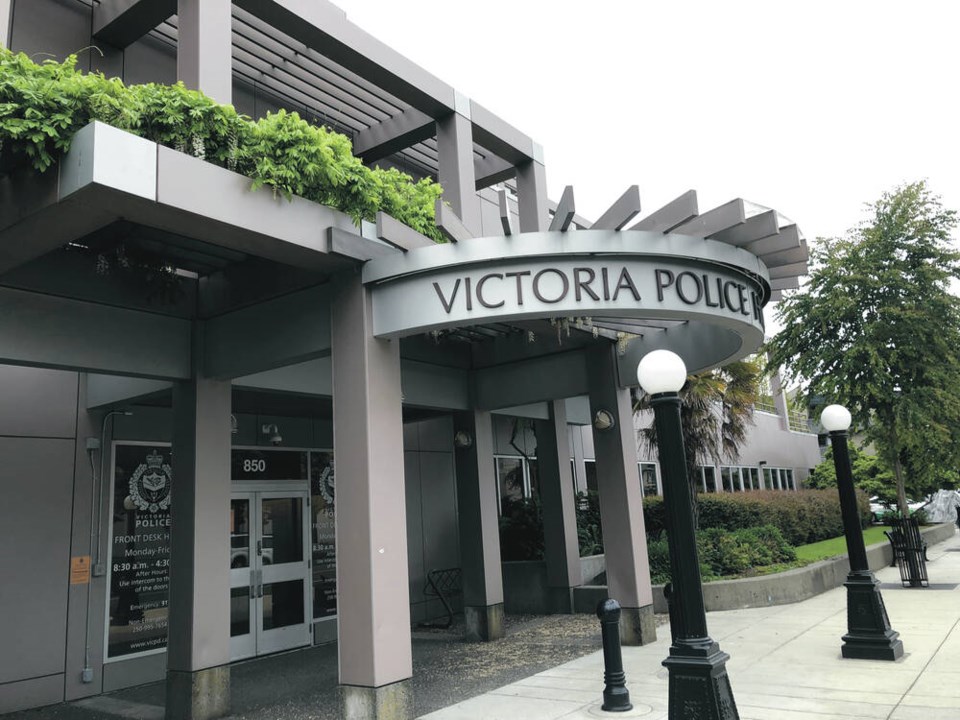The cost of policing Victoria and Esquimalt could jump by nearly 10 per cent next year, according to a preliminary Victoria police budget tabled this week.
While the co-chairs of the Victoria Esquimalt Police Board concede the cost increase is significant, they both have high hopes this year’s budgeting process will be smoother and less fractious than in years past.
“Do I think it’s going to be better than last year? Absolutely. Is it going to be perfectly smooth? Of course not,” said Victoria Mayor Marianne Alto. “No discussions about budgets are smooth these days, because obviously there isn’t an infinite ability to pay. There will be difficult decisions to make and difficult choices to make.”
Esquimalt Mayor Barb Desjardins echoed those sentiments, adding there are already indications things will be better this time given the back and forth between the police board and the two councils.
Desjardins said the budget already reflects some of the feedback from councils.
The preliminary budget includes an overall spending increase of 6.86 per cent or $4.63 million, which would take the budget to $72.14 million.
But that could jump to $74.13 million, representing a 9.8 per cent increase, if the police board gets its way and the province rules that Victoria and Esquimalt, which split the cost of the VicPD budget each year, are on the hook for several items they refused to pay for in 2023 — including a portion of the maintenance budget and some staff positions and services.
The police board appealed to the province to determine who should pay the shortfall, but the province has yet to determine who is on the hook for it.
Desjardins characterized this year’s preliminary budget as status quo, noting maintaining core services now just costs six per cent more.
“It is a significant increase, but it’s a reflection of the realities,” she said.
Desjardins said there are increased costs for E-Comm, the emergency communications centre responsible for answering B.C.’s 911, as well as for union negotiations and settlements, funding for four new staffing positions and work to ensure the health and wellness of the force.
But she remains hopeful the 2024 budget process will be improved by a multi-year budgeting approach suggested by new board member and chair of the finance committee Elizabeth Cull.
“We did hear from the board that they’ve committed to doing budgeting processes that will look out potentially up to five years so that councils aren’t surprised when they see what’s coming forward each year,” she said.
Alto also sang the praises of Cull, a former provincial finance minister, saying Cull intends to start the process earlier, allowing for a more collaborative approach and more meaningful engagement with councils and the broader community.
The police board, which presented its preliminary budget Tuesday night to a joint meeting of Victoria and Esquimalt councils, will tweak the numbers based on the feedback, then return to both councils later this year.
Alto said at that point, she will be wearing her “mayor’s hat” — as opposed to her police board co-chair hat — and tough decisions will have to be made.
“As mayor, I’m looking at the budget of the municipality, and most importantly, the ability of the residents to pay. Because of course, our primary income source is property taxes,” she said. “Finding that balance point then becomes the challenge.”
Alto said the police budget process has been fractious because two distinctly different municipalities have been forced into a joint service.
“We both acknowledge that 20 years later, we are in different places and we’ve evolved differently, we’re moving in different directions,” said Alto. “This needs another look.”
Esquimalt, which pays about 14 per cent of the budget, is in the midst of a process to pull out of the shared policing agreement, which expires at the end of this year.
The municipalities have been required to share the costs of policing since 2002. Before 2002, Esquimalt had a joint police-fire department that had been in place since 1912. A standalone fire department was established in 2003 and 33 police officers joined VicPD.
Esquimalt has argued it is overpaying for services it doesn’t need and is subsidizing Victoria’s policing.



